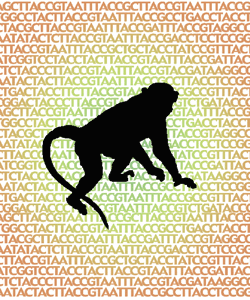|
Monkey Genome Gives New Insight Into What Makes Us Human
The sequencing of the human genome in 2001 was a momentous accomplishment. However, to understand what separates us genetically from our less evolved relatives, researchers need to have the genome sequences of other primates for comparison. An international team of more than 170 scientists has now sequenced the genome of the rhesus macaque monkey and compared it to both the chimpanzee and human genomes. Their analysis reveals that the three primate species share about 93% of their DNA.
 |
Image by Jane Ades, NHGRI. |
The sequencing was carried out at the Baylor College of Medicine Human Genome Sequencing Center, the Genome Sequencing Center at Washington University and the J. Craig Venter Institute. The DNA came from a female rhesus macaque at the Southwest National Primate Research Center San Antonio, which is supported by NIH’s National Center for Research Resources (NCRR). The project itself was funded by NIH’s National Human Genome Research Institute (NHGRI).
The research groups used complementary approaches to independently assemble the genome data and then combined it into a single, “melded” assembly. To improve data quality, they performed smaller scale sequencing on DNA from an unrelated male macaque. The researchers then compared the sequence to the chimp and human genome sequences. Their results were published in the April 13 issue of the journal Science.
The researchers found that macaques split from the line that led to chimps and humans about 25 million years ago. Chimps, our closest relatives, diverged from our ancestors roughly 6 million years ago. Humans and macaques share about 93% of their DNA, in contrast to the 98-99% similarity between humans and chimps.
The team identified nearly 200 genes that appear to play key roles in differences between the species. These include genes involved in hair formation, immune response, cell communication and sperm-egg fusion.
“The rhesus macaque genome helps illuminate what makes us different from other apes,” said Dr. Richard A. Gibbs, project leader and director of the Baylor College of Medicine Human Genome Sequencing Center. “It allows us to learn what has been added or deleted in primate evolution from the rhesus macaque to the chimpanzee to the human.”
In addition to providing important evolutionary insight, the authors expect that the rhesus macaque genome sequence will help research in neuroscience, behavioral biology, reproductive physiology, endocrinology and cardiovascular studies. The rhesus is widely recognized as the best animal model for studying AIDS. It also serves as a valuable model for studying other human infectious diseases and for vaccine research.
With the macaque genome sequenced, scientists can now begin to develop genomic tools to ask questions ranging from what genes are expressed during infection to what variants of genes are important for certain behaviors.
|


